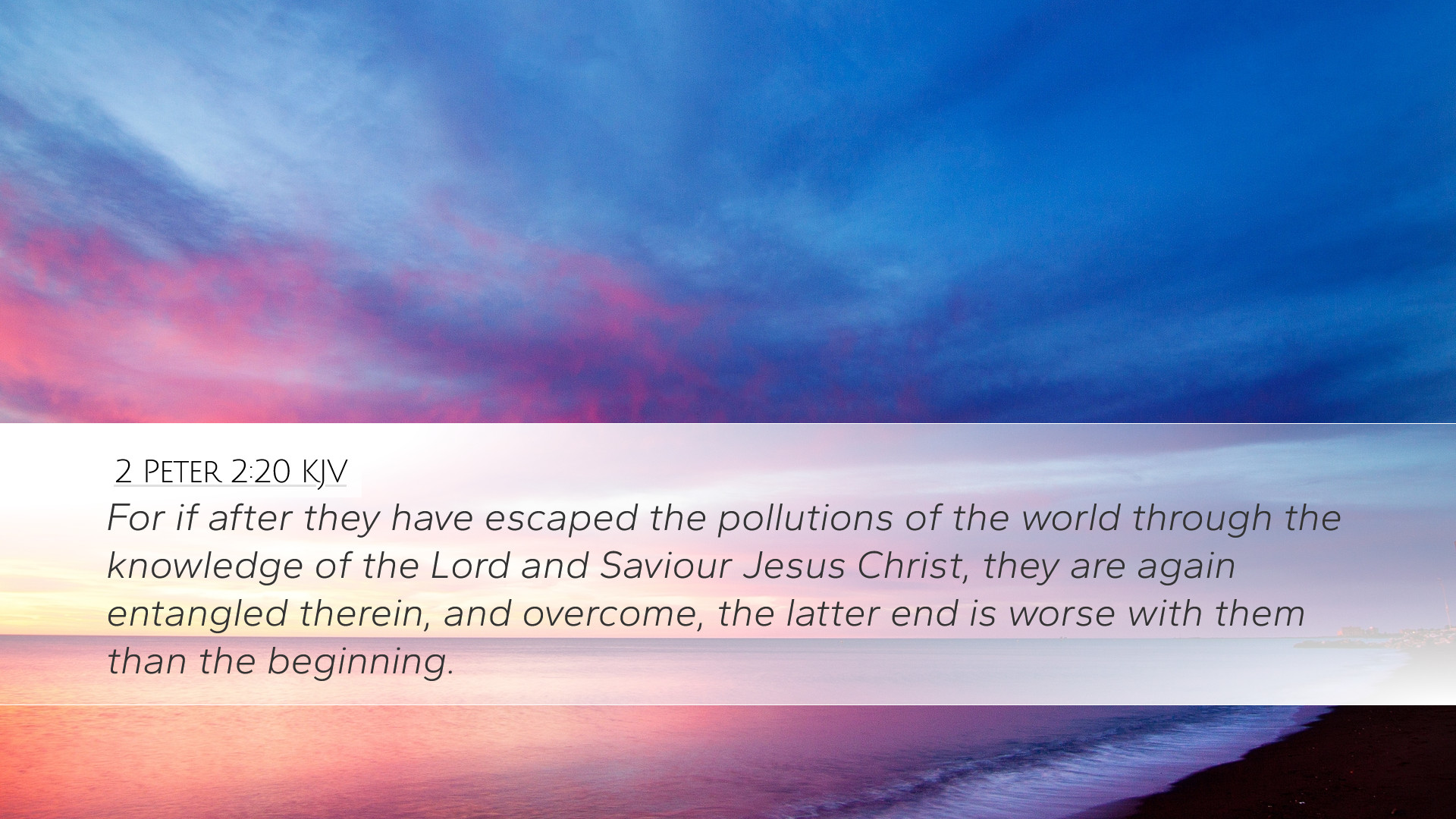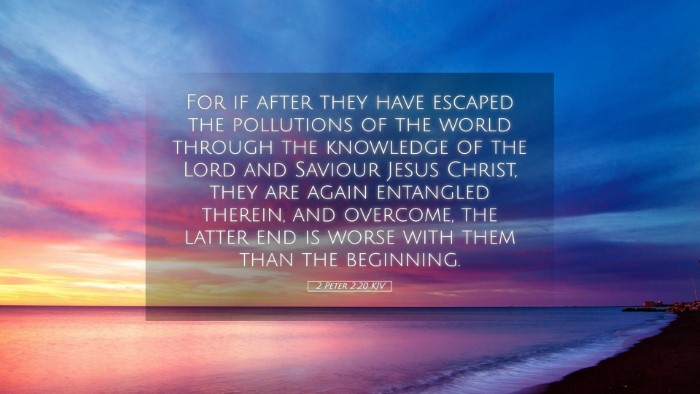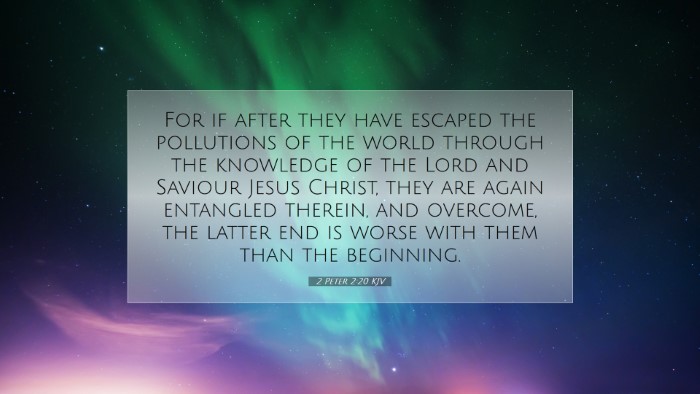Old Testament
Genesis Exodus Leviticus Numbers Deuteronomy Joshua Judges Ruth 1 Samuel 2 Samuel 1 Kings 2 Kings 1 Chronicles 2 Chronicles Ezra Nehemiah Esther Job Psalms Proverbs Ecclesiastes Song of Solomon Isaiah Jeremiah Lamentations Ezekiel Daniel Hosea Joel Amos Obadiah Jonah Micah Nahum Habakkuk Zephaniah Haggai Zechariah Malachi2 Peter 2:20
2 Peter 2:20 KJV
For if after they have escaped the pollutions of the world through the knowledge of the Lord and Saviour Jesus Christ, they are again entangled therein, and overcome, the latter end is worse with them than the beginning.
2 Peter 2:20 Bible Commentary
Commentary on 2 Peter 2:20
Verse: "For if, after they have escaped the pollution of the world through the knowledge of the Lord and Saviour Jesus Christ, they are again entangled therein, and overcome, the latter end is worse with them than the beginning."
Introduction
This verse from 2 Peter addresses a significant issue within the Christian community: the danger of apostasy and the dire consequences that follow a return to worldly ways after having received the knowledge of Christ. Various public domain commentaries shed light on this passage, offering insights that are particularly relevant for pastors, students, and theologians.
Contextual Analysis
The epistle of 2 Peter deals extensively with false teachers and their pernicious influence on believers. Peter is warning the early Church about the serious implications of drifting back into sin after having been enlightened by the truth of the Gospel. This passage serves as a critical point in his argument regarding the peril that such a regression entails.
Insights from Matthew Henry
Matthew Henry emphasizes the plight of those who initially escape the defilements of the world through a genuine understanding of Jesus Christ. He writes about the knowledge mentioned in the verse, signifying a deep faith and experience rather than mere intellectual assent. Henry warns that returning to a state of sin after experiencing true faith makes one’s later condition worse.
- Conditionality of Escape: Henry notes that the escape is conditional, dependent on the personal relationship with Christ. Those who have experienced this are responsible for maintaining their spiritual integrity.
- Severity of Apostasy: He astutely observes that a deeper fall into sin leads to greater condemnation, suggesting those who know the way may be held to a higher standard.
Insights from Albert Barnes
Albert Barnes expounds on the idea of entanglement and overcoming in this verse. He explores the nature of returning to sin, which implies not simply falling but being completely overtaken by the former ways of life. Barnes highlights the tragedy of such a regression:
- Knowledge of Christ: According to Barnes, the knowledge here must be understood as vital and transformative, indicating a personal and active faith.
- Worse End:** The latter end being worse indicates that those who have tasted God’s grace and returned are in a precarious position, much like the Apostle Paul warned in Hebrews 6:4-6.
Insights from Adam Clarke
Adam Clarke provides a thorough exegetical breakdown of this verse. He focuses on the pollution of the world and the stark contrast to the knowledge of Christ:
- True Escape: Clarke underlines that the "pollution of the world" refers to the sinful corruption pervading earthly pursuits which believers must flee from.
- Consequences of Entanglement: He warns that reverting back to sinful ways denotes a grave misunderstanding of one’s relationship with God and can lead to eternal consequences.
- Theological Implications: Clarke emphasizes the theological implications of grace, noting that true faith must result in a life that bears fruit consistent with that faith.
Theological Reflection
This verse poses essential theological reflections on the nature of salvation and the bounds of grace. Believers are called to a life of holiness, sustained through an active relationship with Jesus Christ. The gravity of Peter's warning serves as a reminder that the journey of faith requires vigilance and intentionality.
Practical Application
For pastors and leaders within the church, this passage is a clarion call to shepherd their flocks diligently:
- Teach the Whole Counsel of God: Reinforce biblical truths that emphasize not just initial belief but a continued walk in faith.
- Addressing Backsliding: Create win-win strategies for addressing those who may show signs of returning to worldly ways, providing corrective measures rooted in love.
Conclusion
2 Peter 2:20 stands as a sobering reminder of the fragility of faith amidst the temptations of the world. The combined insights from Matthew Henry, Albert Barnes, and Adam Clarke highlight the importance of perseverance and vigilance in one’s spiritual journey. As students and scholars reflect on this text, they are encouraged to consider both the potency of grace and the tragedy of falling away, reinforcing a commitment to deeper spiritual understanding and discipleship.


